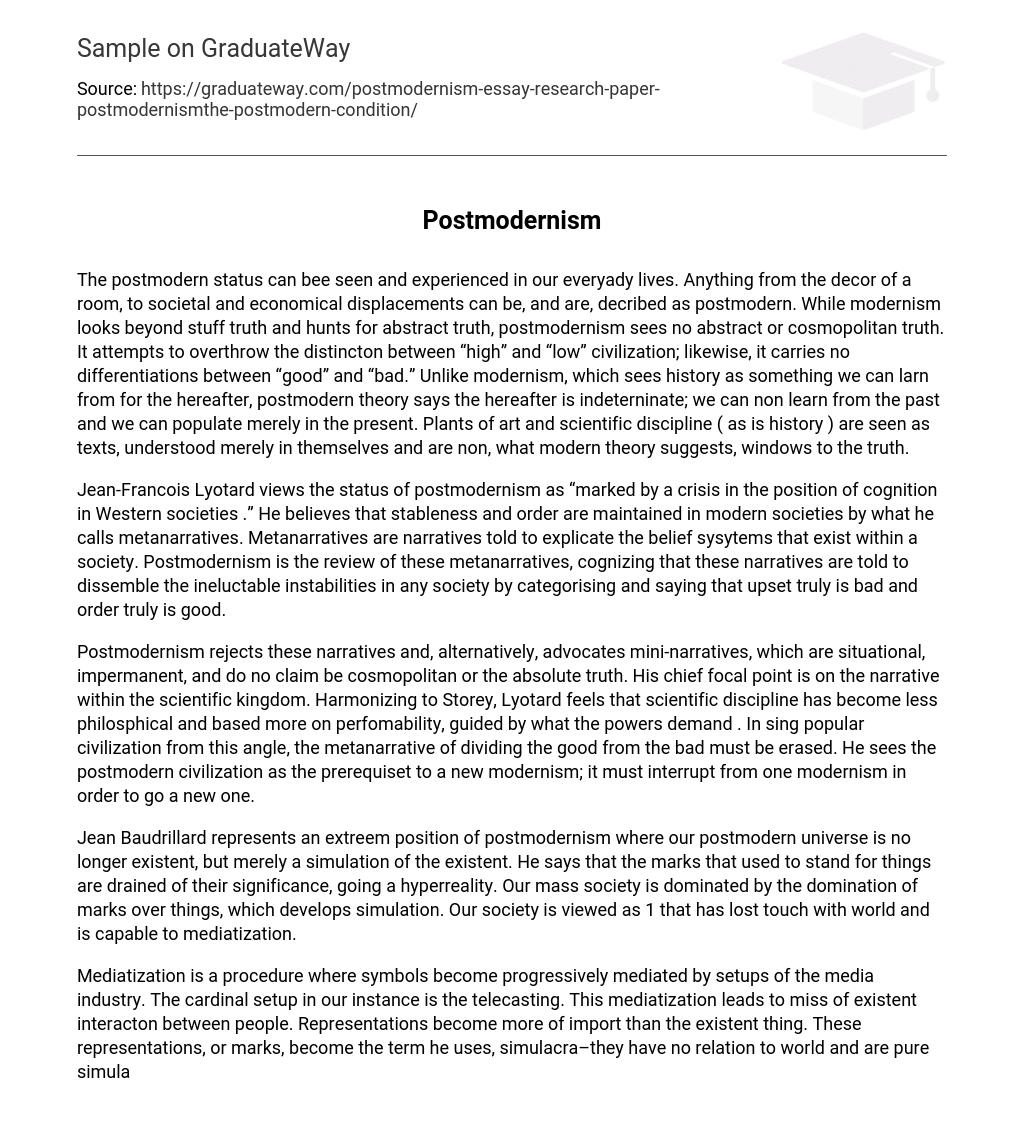The postmodern status can bee seen and experienced in our everyady lives. Anything from the decor of a room, to societal and economical displacements can be, and are, decribed as postmodern. While modernism looks beyond stuff truth and hunts for abstract truth, postmodernism sees no abstract or cosmopolitan truth. It attempts to overthrow the distincton between “high” and “low” civilization; likewise, it carries no differentiations between “good” and “bad.” Unlike modernism, which sees history as something we can larn from for the hereafter, postmodern theory says the hereafter is indeterninate; we can non learn from the past and we can populate merely in the present. Plants of art and scientific discipline ( as is history ) are seen as texts, understood merely in themselves and are non, what modern theory suggests, windows to the truth.
Jean-Francois Lyotard views the status of postmodernism as “marked by a crisis in the position of cognition in Western societies .” He believes that stableness and order are maintained in modern societies by what he calls metanarratives. Metanarratives are narratives told to explicate the belief sysytems that exist within a society. Postmodernism is the review of these metanarratives, cognizing that these narratives are told to dissemble the ineluctable instabilities in any society by categorising and saying that upset truly is bad and order truly is good.
Postmodernism rejects these narratives and, alternatively, advocates mini-narratives, which are situational, impermanent, and do no claim be cosmopolitan or the absolute truth. His chief focal point is on the narrative within the scientific kingdom. Harmonizing to Storey, Lyotard feels that scientific discipline has become less philosphical and based more on perfomability, guided by what the powers demand . In sing popular civilization from this angle, the metanarrative of dividing the good from the bad must be erased. He sees the postmodern civilization as the prerequiset to a new modernism; it must interrupt from one modernism in order to go a new one.
Jean Baudrillard represents an extreem position of postmodernism where our postmodern universe is no longer existent, but merely a simulation of the existent. He says that the marks that used to stand for things are drained of their significance, going a hyperreality. Our mass society is dominated by the domination of marks over things, which develops simulation. Our society is viewed as 1 that has lost touch with world and is capable to mediatization.
Mediatization is a procedure where symbols become progressively mediated by setups of the media industry. The cardinal setup in our instance is the telecasting. This mediatization leads to miss of existent interacton between people. Representations become more of import than the existent thing. These representations, or marks, become the term he uses, simulacra–they have no relation to world and are pure simulation. He leaves us with the decision that there is no absolute truth or implicit in significance; there are merely different versions of things.
Frederic Jameson, a Marxist, says postmodernism corresponds to a stage of late capitalist economy. He argues that within each society, merely one cultural manner will rule the remainder. “Postmodernism is ‘ the cultural dominant of transnational capitalist economy, which places accent on selling, merchandising, and devouring trade goods ( non bring for thing them ) . One of his cardinal thoughts was that of commodification. In this procedure, things that were practical parts of mundane life and non usually parts of “civilization” now are merchandises to be commodified. This creates the “civilization industry”.
Another thought is that there is a dislocation in destunguishing civilization from the society that produces it. In this visible radiation, postmodernism “marks the ‘ decease of the topic’, the terminal of individuality .” He uses the illustration of nostalgia movies ( i.e. Back to the Future ) which do non seek to recapture the past, but alternatively are satisfied with cultural myths and stereotypes about the yesteryear, offering a “false pragmatism”. He calls the postmodern civilization “schitzophrenic” claiming it suffers from “historical memory loss” working merely in the present. The postmodern civilization is seen as hopelessly commercial where civilization is economic alternatively of ideological.
I agree with Storey whan he says that postmodern has become a bombilation word; it seems to be the latest tendency. But, I agree with Lyotard s concluding that we have to be postmodern in order to make a mew modernism. As I look around myself, I can clearly see all the metanarratives he addresses and it becomes really distressing. Personally, I try to utilize the mini-narratives he prefers because everything is comparative and isn’t merely black and white. With Baudrillard, nevertheless, I do non believe that there is absolutly no underlying significance, but our society is surely heading toward that way. Peoples prefer to populate through their computing machines alternatively if interacting straight with the universe around them.
But, can you bame them.There are surely pleanty of unpleasant things we would instead ingnore than unrecorded with in this universe ( . Jameson is definetly right that we sell ourselves a false pragmatism of the yesteryear. There are surely facts about the mid-20th century that have been reasonably good concealed; for illustration, atomic and boilogical testing on our ain citizens, which is denied up to this twenty-four hours by classified authorities papers cipher is allowed to see. Not to advert the false pragmatism about the atomic weaponries race with the former Soviet Union; the U.S. dreamed up that they had more arms than we did merely to warrant paying for nulcear defences.





